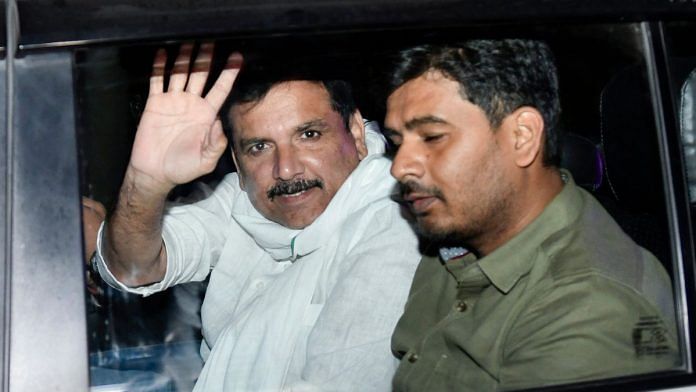New Delhi: Six months after Sanjay Singh was arrested, the Supreme Court Tuesday granted bail to the senior Aam Aadmi Party (AAP) leader in the Delhi liquor policy case.
The bench comprising Justices Sanjiv Khanna, Dipankar Datta and Prasanna B. Varale granted him bail after the Enforcement Directorate (ED) submitted that his custody was no longer required.
Singh was arrested in the case by the ED in October last year, and was now in judicial custody. His bail plea was rejected by the trial court in December last year, and by the Delhi High Court in February, after which he approached the Supreme Court.
Before the lunch break, the top court urged Additional Solicitor General S.V. Raju to seek instructions on whether the ED still requires Singh’s custody. It had also reminded Raju about the implications if the court passes an order on merits.
Section 45 of the Prevention of Money Laundering Act, 2002 has two pre-conditions for granting bail — there should be prima facie satisfaction that the accused has not committed the offence and that he is not likely to commit any offence while on bail. The public prosecutor has to be given an opportunity to oppose the bail application.
“Mr Raju please keep in mind we have to as per Section 45 observe in favour of the petitioner; please understand the implications of that during trial. So get instructions on whether you need further custody,” the court was quoted as saying by Bar and Bench.
‘Travesty of justice’
The ED has alleged payment of Rs 2 crore by businessman Dinesh Arora at Singh’s official residence. Arora later turned approver in the case, and Singh was arrested based on his allegations.
While refusing bail in February, the high court had observed, “Thus, prima facie, it is clear that the present applicant (Singh) was part of the preparation of the old excise policy and thereafter, the new excise policy was made to suit the co-accused(s) who were to pay kickbacks to the present applicant and co-accused(s) and the party concerned, from the profit so generated due to excise policy.”
During the hearing Tuesday, senior advocate Abhishek Manu Singhvi told the court that Singh had not been named in the case initially, and that his name was added on an approver’s statement. He pointed out that Arora was granted bail in the case after the ED’s “no-objection”, which was then leveraged for convincing him to turn approver.
Singhvi also objected to the fact that certain exculpatory (involving the removal of blame from someone) statements made by Arora had been placed in “unrelied documents”, which Singh cannot get access to.
“Dinesh Arora was sent to judicial custody, after which he made allegations for the first time. Apart from this, there are unrelied documents, another travesty of justice,” he submitted.
(Edited by Tony Rai)
Also Read: ED questions Delhi minister Kailash Gahlot — ‘part of Group of Ministers who prepared excise policy’



